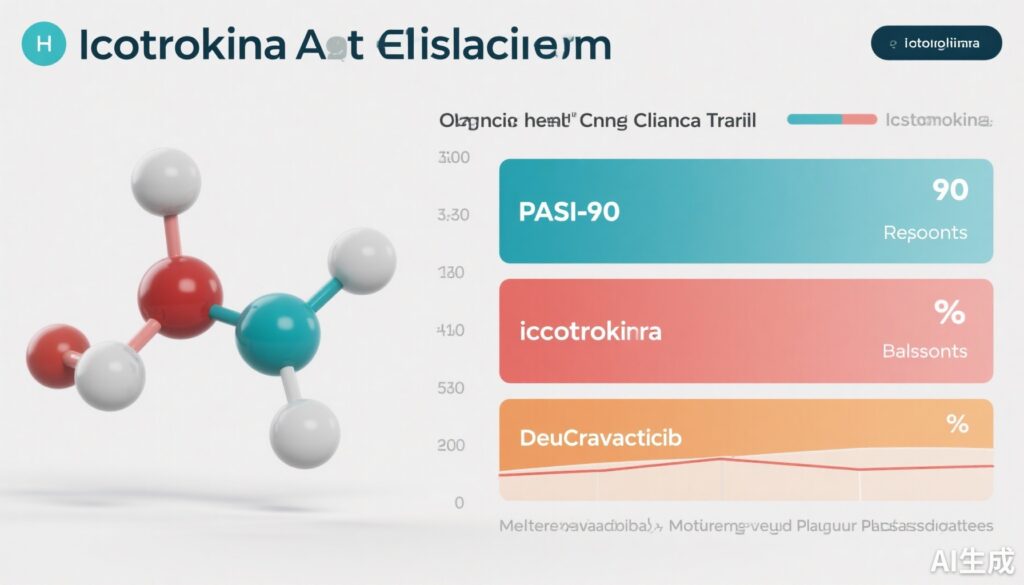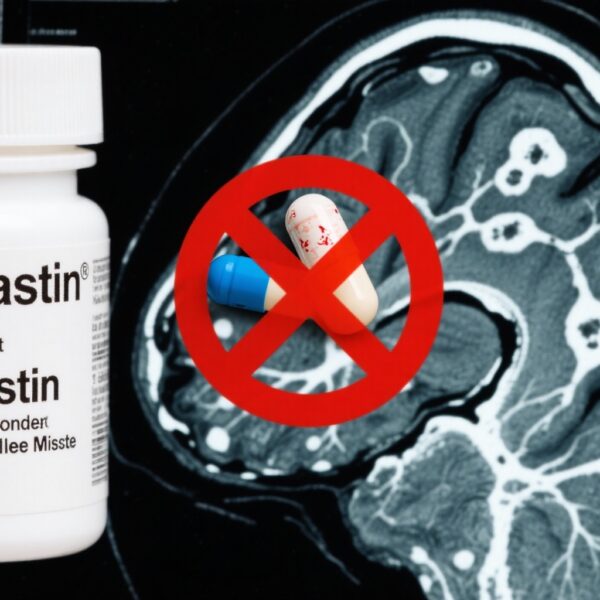Highlights
- Icotrokinra, an oral IL-23 receptor-targeted peptide, showed superior efficacy in achieving skin clearance (IGA 0/1 and PASI 90) compared to placebo and the oral TYK2 inhibitor deucravacitinib in two large phase 3 trials.
- Both ICONIC-ADVANCE 1 and 2 demonstrated robust clinical responses at week 16 with significant treatment differences favoring icotrokinra (p<0.0001).
- The safety profile of icotrokinra was favorable, with adverse event rates comparable to placebo and lower than deucravacitinib at week 24.
- This advances therapeutic options for moderate-to-severe plaque psoriasis by combining convenience of oral administration with potent IL-23 pathway inhibition.
Background
Plaque psoriasis is a prevalent chronic inflammatory dermatologic condition characterized by keratinocyte hyperproliferation and immune dysregulation, significantly impacting quality of life. Interleukin (IL)-23 and IL-12 cytokines play central roles in pathogenesis, driving T-helper 17 (Th17) cell responses. Monoclonal antibodies targeting IL-23 and IL-12 (e.g., ustekinumab, guselkumab) have revolutionized moderate-to-severe psoriasis treatment but require parenteral administration, limiting patient convenience.
Recent therapeutic advances aim for oral agents with targeted immunomodulation. Deucravacitinib, a selective oral tyrosine kinase 2 (TYK2) inhibitor impacting IL-23 signaling, was approved for plaque psoriasis with demonstrated efficacy. Icotrokinra (JNJ-77242113), a novel oral peptide selectively binding to the IL-23 receptor, represents a mechanistically distinct and potentially efficacious oral alternative. The ICONIC-ADVANCE 1 and 2 trials assessed efficacy and safety of once-daily icotrokinra compared to placebo and deucravacitinib in adults with moderate-to-severe plaque psoriasis.
Key Content
Trial Designs and Patient Population
ICONIC-ADVANCE 1 and ICONIC-ADVANCE 2 are similarly designed multinational, randomized, double-blind, placebo-controlled, and active-comparator-controlled phase 3 trials (NCT06143878 and NCT06220604). They enrolled adults with stable moderate-to-severe chronic plaque psoriasis for at least 26 weeks, defined by body surface area involvement ≤10%, PASI ≤12, and Investigator’s Global Assessment (IGA) ≤3, across 13 and 11 countries, respectively.
Randomization ratios differed slightly: ADVANCE 1 assigned participants in a 2:1:2 ratio to icotrokinra 200 mg once daily, placebo, or deucravacitinib 6 mg once daily; ADVANCE 2 used a 4:1:4 ratio. Participants initially on placebo or deucravacitinib transitioned to open-label icotrokinra at week 16 or 24, respectively.
Efficacy Outcomes
Primary endpoints in both trials were the proportions of patients achieving IGA 0 or 1 (clear or almost clear skin with at least a two-grade improvement from baseline) and PASI 90 (≥90% improvement in PASI) at week 16 comparing icotrokinra with placebo.
Results demonstrated remarkable efficacy of icotrokinra:
- ICONIC-ADVANCE 1: IGA 0/1 achieved by 68% of icotrokinra vs 11% placebo; PASI 90 achieved by 55% vs 4%, with treatment difference 95% confidence intervals showing statistical superiority (p<0.0001).
- ICONIC-ADVANCE 2: IGA 0/1 by 70% vs 9%; PASI 90 by 57% vs 1%, similarly meeting co-primary endpoints (p<0.0001).
Comparisons to deucravacitinib showed that icotrokinra had higher response rates by week 16, implicating a possible efficacy advantage over the existing oral agent.
Safety and Tolerability
Adverse event (AE) profiles were comparable or favorable for icotrokinra. Up to week 16, AE rates were 48% with icotrokinra and 57% with placebo, indicating no increase in overall tolerability concerns. Common AEs in both groups were nasopharyngitis and upper respiratory tract infections, consistent with known infection risks for immunomodulators.
By week 24, while adverse events were reported in 57% of icotrokinra-treated participants, the rate was lower compared to 65% with deucravacitinib, suggesting an improved safety/tolerability profile. No new safety signals were identified.
Comparative Interpretation and Mechanistic Insights
Icotrokinra’s targeted inhibition of the IL-23 receptor differentiates it mechanistically from deucravacitinib’s TYK2 inhibition, which affects multiple cytokine pathways including IL-12, IL-23, and type I interferons. The direct receptor blockade may offer more specific immunomodulation leading to enhanced efficacy and safety.
These trials are the first large-scale phase 3 studies positioning an oral IL-23 receptor antagonist in direct comparison with a recently approved oral TYK2 inhibitor, marking a shift towards personalized, oral systemic therapies for psoriasis.
Expert Commentary
The ICONIC-ADVANCE program reinforces the central role of the IL-23/Th17 axis in psoriasis pathogenesis and demonstrates that oral agents with precise targeting can rival injectable biologics in efficacy and safety. Icotrokinra’s superior PASI 90 and IGA 0/1 achievement at week 16 positions it as a potential frontline oral systemic therapy.
While injectable monoclonal antibodies remain standards for long-term control and severe disease, oral therapies improve patient adherence and quality of life. The consistent safety profile comparable with placebo alleviates concerns over systemic immunosuppression inherent in oral agents.
Several limitations require consideration: patient populations had moderate disease activity (PASI ≤12), excluding very severe cases. Longer-term safety and efficacy data beyond 24 weeks are pending. Additionally, head-to-head comparisons with injectable biologics will be important to define the precise therapeutic niche of icotrokinra.
Clinical guidelines will likely incorporate oral icotrokinra as an alternative for patients seeking non-injectable options, or those with contraindications to biologics or TYK2 inhibitors.
Conclusion
The ICONIC-ADVANCE 1 and 2 phase 3 trials provide robust evidence that once-daily oral icotrokinra offers superior efficacy over placebo and deucravacitinib with a tolerable safety profile in moderate-to-severe plaque psoriasis. This oral IL-23 receptor antagonist opens a new therapeutic avenue, potentially transforming psoriasis management by combining potent immunomodulation with patient convenience.
Continued surveillance of long-term outcomes and real-world effectiveness will clarify its role alongside existing biologics and oral agents. Future research should explore combination strategies, applicability in more severe disease, and mechanistic biomarkers predicting response.
References
- Gold LS, Armstrong AW, Bissonnette R, et al. Once-daily oral icotrokinra versus placebo and once-daily oral deucravacitinib in participants with moderate-to-severe plaque psoriasis (ICONIC-ADVANCE 1 & 2): two phase 3, randomised, placebo-controlled and active-comparator-controlled trials. Lancet. 2025;406(10510):1363-1374. doi:10.1016/S0140-6736(25)01576-4. PMID: 40976249.
- Lebwohl M, Blauvelt A, Wortmann R, et al. Deucravacitinib versus placebo in moderate-to-severe plaque psoriasis. N Engl J Med. 2022;387(22):2108-2120. doi:10.1056/NEJMoa2203162.
- Guttman-Yassky E, Blauvelt A. IL-23/IL-17 axis in psoriasis pathogenesis: therapeutic insights. J Allergy Clin Immunol. 2017;140(5):1243-1256. doi:10.1016/j.jaci.2017.06.033.


